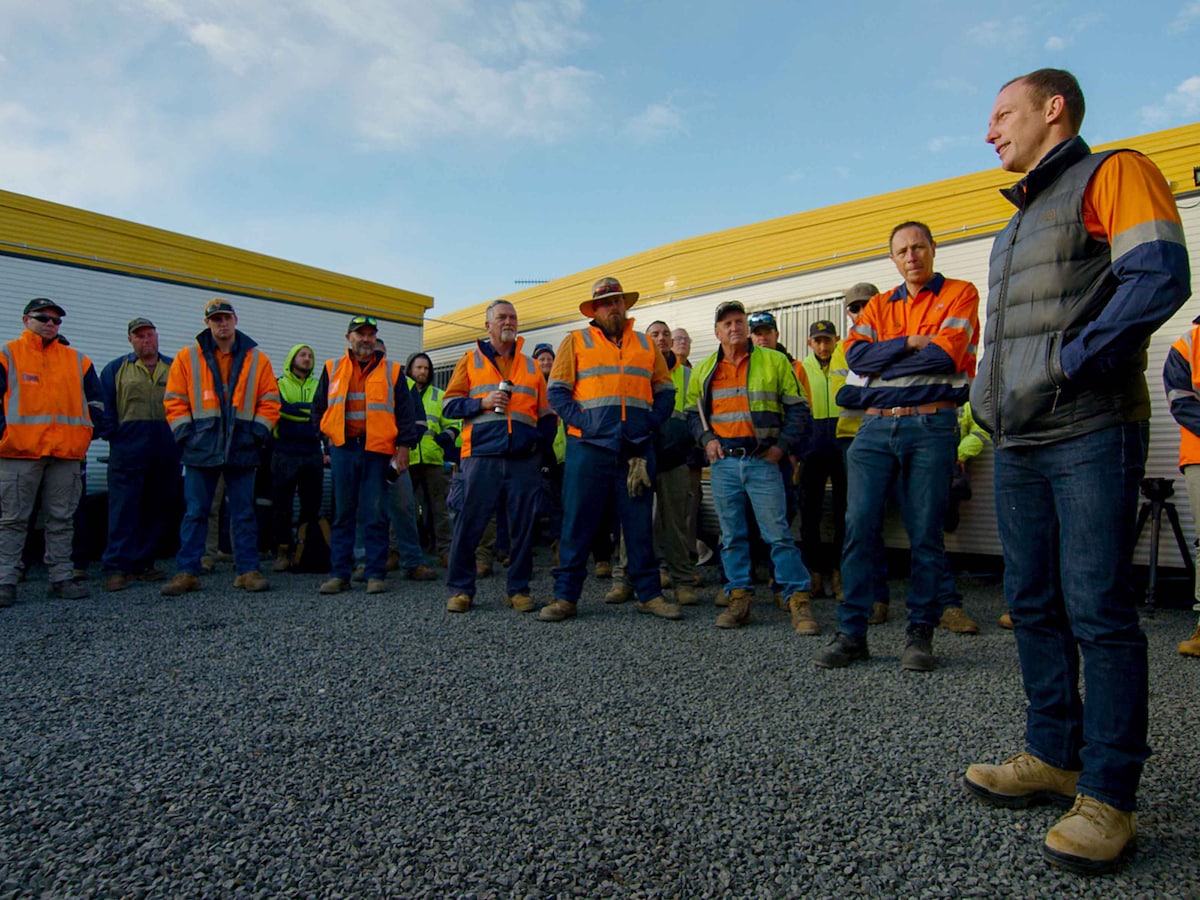Generation
The mix of traditional and new generation is changing.

Browse by topic

Developing an offshore wind industry could boost Australia’s energy transition
AGL Chief Operating Officer Markus Brokhof highlights AGL’s support for the potential role of offshore wind in the transformation of Australia’s energy system.

AGL Energy Customer Council Open Letter
An open letter from the AGL Energy Customer Council about the future of the energy transition.

You little butane at Wallumbilla
Butane is a useful gas, with almost limitless applications. In fact, you’ve probably used some today already with your own hands. And now we’re using it in a world-first to power one of our Queensland sites in a more sustainable and efficient way.

Spotlight on: flexible generation
The rise of renewable energy and the demand on the national grid is changing. There’s a pivotal need for generation that’s flexible – and that can respond to sudden peaks in demand within minutes. Why is that important – and what does it look like?

Explainer: the duck curve
The energy sector is infamously jargon-heavy, and even with a handy glossary of terms at your fingertips it can often be a tough slog reading about developments and issues in the energy industry. One rather abstract term cropping up more frequently is the ‘duck curve’ – but what is a duck curve? And what does it have to do with energy?

People-powered progress at Mount Beauty
How often do you find a mother and son working together in the new renewable energy sector? Well, that’s what Marion and Ken Birt do – and it works for them.

Shining a light on our people
As an essential service provider and one of Australia’s oldest companies, we take our role in in the community seriously. We’re committed to our purpose, ‘Progress for Life’, which is a relentless determination to make things better for our customers, our communities, our planet, and our economy.

People-powered progress at Torrens and Barker Inlet Power Stations
AGL has a long history in Australia – we’re 184 years old. And for many people, it’s almost a family business – just ask Jim and Jonathan Schroeter.

Fast and flexible energy from Barker Inlet Power Station
The influx of utility-scale renewables and rooftop solar means there’s a greater need for highly flexible firming energy sources which can be activated at a moment’s notice during times of high demand. The Barker Inlet Power Station (or BIPS) is nearing the final stages of construction, and it exemplifies this firming capacity.

Deep dive: peaks and troughs in demand
In the middle of the day, the abundance of rooftop solar often produces more energy than the grid needs… but when the sun goes down and everyone heads home, energy demand soars. What are the implications?

Firm support for an evolving energy mix
The energy market is changing – and we need to take the lead and look at what energy mix will suit the dynamics of the market. We’re taking a look at the role of firming capacity to support that mix.

Keep on trucking to peaking power
Keep on trucking! The first of three massive transformers arrive at the Barker Inlet Power Station, which when complete later this year will provide quickstart peaking power and grid stability for South Australia.

Component arrives for Coopers Gap
Coopers Gap Wind Farm Project recently saw the largest and heaviest section of the 3.8MW tower arrive at site. This section of the tower weighs 77 tonnes, has a diameter of 5 metres and is 13.6 metres long.

Transition at Torrens Island
From September 2019, AGL will progressively mothball the 52-year-old Torrens A Station – starting with A2 and A4 – following the start of commercial operation of the 210MW Barker Inlet Power Station. The four Torrens B generating units will continue to operate as normal.

Solar powered Easter eggs
We all know about (and expect) the increased energy that comes with eating chocolate, but have you ever thought about the amount of energy it takes to make it? It takes a lot of cooling to keep Easter eggs at the perfect eating temperature. That’s why Heritage Fine Chocolates (now Darrell Lea Chocolates), have installed AGL solar panels at their Rowville factory - reducing their energy costs and emissions.

EUAA paper proposes solutions to gas supply shortages
The Energy Users Association of Australia released a National Gas Strategy Discussion Paper proposing solutions to gas supply issues. How does this support steps AGL is taking to address gas supply?

Flexing supply
How is our portfolio evolving to meet changes in demand and technology? Peaking power, like the proposed Kanmantoo Pumped Hydro project can be flexible and responsive to demand – providing extra energy when it’s needed most.

Progressing our lighting efficiency upgrade on site
Last year we committed $11m to Stage 1 of large-scale lighting upgrade across AGL’s operating facilities. Once complete, we expect the whole project to reduce our carbon impact by 35,000 tCO2e/y – that’s the equivalent of taking over 10,500 cars off the road for a year.

Prepping our sites for peak period
During those really hot days in Summer, energy demand hits its peak. To help maintain safe, sustainable and reliable energy for our customers and the community, we recently made a number of upgrades on site.

Supporting what matters to our communities
AGL’s Camden Gas Project Local Community Investment Program invests funds back into the community, for the community. Supporting community initiatives, projects and events that matter to the people in the Macarthur.

Upgrade is increasing capacity, not emissions
Last week, AGL announced a $25 million investment to boost generation at our Loy Yang Power Station, without increasing coal consumption or emissions.

Trading sunshine with AGL Solar Exchange
While Australia is leading the way in the installation of rooftop solar systems, there are many people who can’t put panels on their roof. This could be because they are renting, living in an apartment or a home without a suitable roof, or there may be financial constraints preventing the investment.

Planning ahead and collaboration are the ingredients for a strong future
No forced redundancies’ is a commitment we’ve made to our people at Liddell as we work towards its long-planned retirement in 2022. For us, long-term planning and making sure our people and the community are supported in the transition is not negotiable.

10 years of research into carbon capture
The transition to a low carbon future will require a range of solutions and this is why we are proud to partner with CSIRO and others in carbon capture research over the past 10 years. But what does this have to do with tomatoes?

The rise of solar and its part in an energy mix
AGL welcomed Maoneng Australia’s announcement that it had reached financial close for the 255 megawatt (MW) Sunraysia Solar Farm. This solar farm is underpinned by Power Purchase Agreements under which UNSW Sydney and AGL Energy purchase the solar energy generated over 15 years. This solar energy will help contribute to our diverse energy mix.

The impact of rooftop solar on demand
In the middle of a sunny day, rooftop solar could soon supply more energy than South Australia needs at that time of day. But when the sun goes down, this generation tails off, which is also when peak demand kicks in. Read more about the impact of rooftop solar on demand.

Transforming to a renewable hub
Our commitment to a progressive energy future is as evident as ever in Broken Hill and Silverton where the city has transformed to a renewable energy hub. A heritage city that used to mine the earth, is now mining the sun and wind for energy.

Frequently Asked Questions about Liddell Power Station
Liddell Power Station reaches the end of its technical life in 2022 and can be replaced with the latest technology at a lower cost than trying to keep the plant running.

Submission to the National Wind Farm Commissioner Review
The Minister for the Environment and Energy, the Hon Josh Frydenberg MP, asked the Climate Change Authority to conduct a special review of the role of the National Wind Farm Commissioner.

Broken Hill Solar Plant viewing platform opens
Timothy’s design not only makes a valuable and lasting contribution to the artistic and cultural landscape of Broken Hill, but also helps to showcase the importance of renewables in the NSW energy mix.

Submission to Senate inquiry into the Clean Energy Finance Corporation Amendment (Carbon Capture and Storage) Bill 2017
On 8 February 2018, the Senate referred the Clean Energy Finance Corporation Amendment (Carbon Capture and Storage) Bill 2017 to the Environment and Communications Legislation Committee for inquiry.

Submission to ACCC on gas pricing
AGL has made a submission to the ACCC regarding its proposal to publish a netback price for LNG.

Can you build a new coal-fired power station for less than a renewable, gas and storage mix?
AGL has developed a plan to use a mix of renewables, gas and storage to replace the energy produced by Liddell Power Station before its 2022...

Why an energy mix makes more sense than new coal
While carbon risk is a reality that every business needs to assess, the closure of Liddell Power Station and the selection of a mixture of energy...

Rehabilitating our assets
As outlined in our 2017 Sustainability Report, our approach to the rehabilitation of assets is guided by three underlying principles.

Submission to Review of the Victorian Declared Wholesale Gas Market
AGL made this submission in response to the Review of the Victorian Declared Wholesale Gas Market.

AGL Coopers Gap Wind Farm steps closer
AGL Coopers Gap Wind Farm project manager, Evan Carless, said this was a very encouraging milestone for the project.
.png)
Construction to begin at Silverton wind farm
Construction at AGL's 200 MW Silverton wind farm is now set to begin, after a successful sale into the Powering Australian Renewables Fund (PARF).

Silverton Wind Farm gets green light
In a major step forward for AGL's Silverton Wind Farm project, the NSW Planning Assessment Commission (PAC) has approved the construction of the wind farm. The independent PAC approved AGL's Modification 3 application, which takes advantage of advancements in wind turbine technology, reducing the number of wind turbines required to be built.






